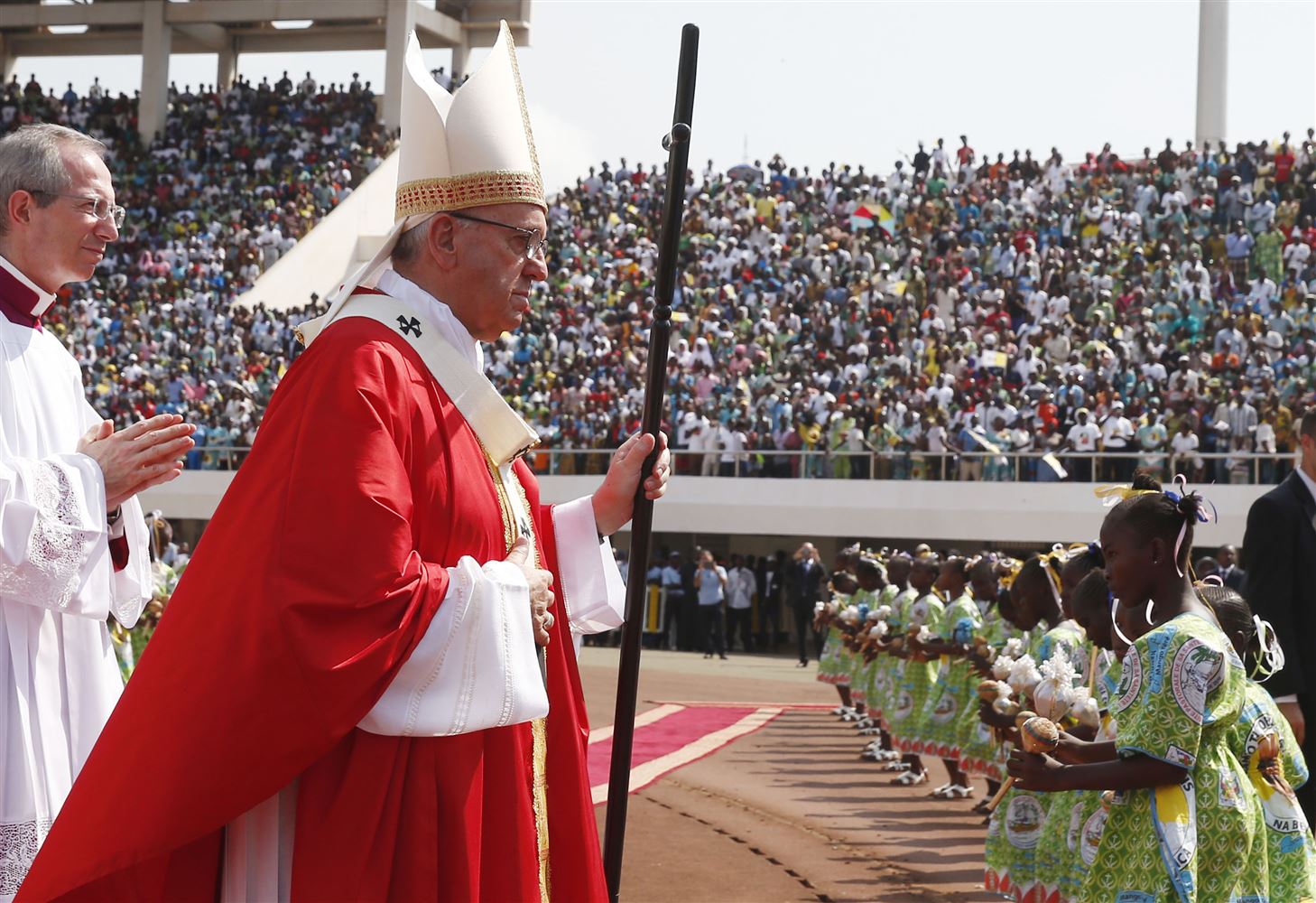By Paschal Norbert
NAIROBI, APRIL 22, 2025 (CISA) – From the moment Pope Francis stepped onto African soil in 2015, his presence radiated more than just the symbolic weight of the papacy, it signaled a profound solidarity with the people of the continent, especially the poor, the marginalized, and the victims of war and injustice.
Since the beginning of his pontificate, Pope Francis has carried the weight of the world’s suffering on his shoulders, walking boldly into places where pain, poverty, and division often rule. Among the continents he visited, Africa stood out – not only for its challenges but also for its vibrant faith, youthful energy, and resilience. Across ten nations in the African continent, Pope Francis didn’t just deliver speeches, he left footprints of compassion, healing, and prophetic courage.
Kenya – 2015
Pope Francis’ first steps on African soil were in Nairobi, Kenya, in November 2015. He began his visit with a deeply symbolic meeting at the United Nations Environment Programme (UNEP) headquarters, becoming the first pope to visit the global environmental body. There, he linked the fight against climate change with the fight for human dignity.
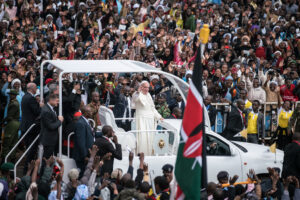
“We are not faced with two separate crises, one environmental and the other social, but rather one complex crisis,” he said, stressing the need for an ecological conversion.
Amidst the lush greenery and urban energy of Nairobi, Pope Francis began his first African journey. Speaking to thousands, he decried the “dreadful injustice of global inequality” and urged care for the environment.
“Africa is a continent of hope… Let us say ‘no’ to corruption, violence, and selfishness, and ‘yes’ to honesty, peace, and solidarity.”
His message was deeply tied to his encyclical Laudato Si’, emphasizing ecological and social justice.
At the Kangemi informal settlement, he visited St. Joseph the Worker Catholic Church, a parish run by the Jesuits in Kenya, a place rarely visited by world leaders, Pope Francis called out the injustice of urban exclusion and challenged both the Church and society to restore dignity to the poor.
The Pope also celebrated Mass at the University of Nairobi grounds, where hundreds of thousands gathered under the rain, expressing Kenya’s deep faith. His homily focused on the strength of the family and the need to build societies that protect children and women. He met with young people at Kasarani Stadium and urged them to be agents of peace in a country recovering from post-election violence. His embrace of interreligious dialogue came through in meetings with Christian leaders and Muslim representatives, calling them to unity in countering extremism.
Uganda – 2015
In Uganda, Pope Francis honored the memory of the 22 Catholic and 23 Anglican martyrs who were killed in the late 19th century for their faith. His visit to Namugongo, where he celebrated Mass at the Catholic Shrine and prayed at the Anglican Shrine, was a powerful gesture of ecumenical solidarity. Thousands gathered for the celebration, which underscored the shared Christian witness in the country’s history.
“The martyrs, both Catholic and Anglican, are true national heroes,” he said. “Their witness of love for Christ and their fidelity to truth can help guide Uganda today.”
He also visited the Nalukolongo home for the elderly and disabled, one of the most touching moments of his journey, where he reminded the Church to always be close to the marginalized. At a youth gathering in Kololo, he responded to testimonies of suffering and resilience, urging young Ugandans to build a future free of corruption and tribal divisions. His warmth, humility, and spontaneity touched many hearts, especially when he abandoned prepared texts to speak directly from the heart.
opened the Holy Door of Mercy at the Notre Dame Cathedral, Bangui,
Perhaps the most daring and historic visit of his African journeys was to the Central African Republic, a country wracked by violent sectarian conflict. Against the advice of many, Pope Francis entered Bangui in what was essentially a war zone. There, in an extraordinary act, he opened the Holy Door of Mercy at the Notre Dame Cathedral, Bangui, days before it was opened in Rome, making Bangui the spiritual heart of the Catholic world.
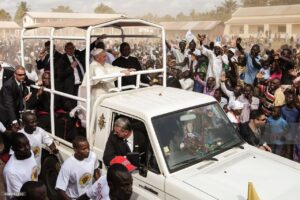
“Bangui becomes today the spiritual capital of the world,” he proclaimed, signaling hope and peace from a place marked by devastation.
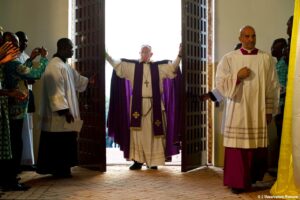
During his stay, he visited a refugee camp where he embraced women and children displaced by war, listening to their stories with tears in his eyes. His interfaith engagement reached its climax when he visited the Koudoukou central mosque in the PK5 neighborhood, a Muslim enclave surrounded by Christian militias.
Walking alongside the Imam, he declared, “Christians and Muslims are brothers.” This moment of profound symbolism sent shockwaves around the globe and helped open dialogue channels within the country.
Egypt – 2017
In 2017, Pope Francis traveled to Egypt with a mission of peace and religious coexistence. He addressed an international peace conference at Al-Azhar University alongside Grand Imam Ahmed el-Tayeb. His speech was a robust defense of religion’s role in promoting peace rather than violence.
“Peace alone is holy,” he stated. “Peace is a gift from God, but it is also the result of human effort.” His call for unity between Muslims and Christians resonated strongly in a country often scarred by sectarian tensions.
The Pope also celebrated a public Mass at the Air Defense Stadium, attended by thousands of Egyptian Catholics. Despite being a religious minority, the vibrant faith of the Egyptian Church shone brightly. In a meeting with clergy and religious at the Coptic Catholic Seminary, he encouraged perseverance amidst adversity, reminding them that “true faith is tested by fire.” His visit came just weeks after deadly attacks on Coptic Christians, making his presence a source of courage and solidarity.
Morocco – 2019
Pope Francis’ visit to Morocco was shaped by the global migration crisis and the need for interreligious understanding. In Rabat, he met with King Mohammed VI and visited the Mohammed VI Institute for the Training of Imams, a bold sign of respect for Islam’s role in promoting moderate religious education. Speaking to both Christians and Muslims, he warned against using religion to incite violence and instead emphasized it as a bridge to mutual understanding.
At a center run by the Catholic Church to serve migrants, he met men, women, and children fleeing conflict and poverty. He reminded the world that migrants “are not pawns on the chessboard of humanity” and called for dignified treatment and comprehensive policies that protect them. His outdoor Mass in Rabat, attended by over 10,000 people of multiple nationalities, showcased a Church that is small in number but great in witness.
Mozambique – 2019
Pope Francis landed in Mozambique with a message of healing and reconciliation. The country had recently signed a peace agreement after decades of civil conflict. In Maputo, he praised the efforts of the Mozambican people to choose peace over revenge and justice over division.
“Peace is not the absence of conflict, but the tireless commitment to recognize, protect, and restore the dignity of our brothers and sisters,” he told civil authorities.
He visited Zimpeto Hospital and the DREAM Center for HIV patients, where he highlighted the Church’s role in healthcare and solidarity. At a joyful Mass in Zimpeto Stadium, he invited Mozambicans to dream big and keep building bridges of reconciliation. His meeting with young people included heartfelt appeals for courage and a rejection of corruption and violence.
Madagascar – 2019
Madagascar’s warm welcome of Pope Francis in 2019 reflected the deep faith of its people. He visited Akamasoa, a community built by missionary Fr Pedro Opeka, a Catholic Argentinian-Slovenian priest, to lift people out of poverty and give them dignity through work. Addressing the crowd, the Pope declared, “Poverty is not inevitable,” applauding the transformation of a former landfill into a thriving community.
He also addressed government leaders and urged ethical leadership rooted in service, not personal gain. His Mass in Antananarivo drew nearly a million faithful, where he stressed that “the measure of greatness in the kingdom of God is to become a servant.” His concern for deforestation and environmental degradation was also clear during his visit to the Soamandrakizay field, where he called for stewardship of creation in a land threatened by ecological destruction.
Mauritius – 2019
In Mauritius, Pope Francis honoured the memory of Blessed Jacques-Désiré Laval, the “Apostle of Mauritius,” whose shrine he visited upon arrival. The Pope celebrated Mass at the Mary Queen of Peace Monument in Port Louis, speaking about the need to maintain the country’s unity and harmony amidst growing economic inequalities.
“Do not let prosperity blind you,” he warned, urging the country not to forget its roots and the poor.
Meeting with civil society, he lauded Mauritius’ tradition of interreligious dialogue and peaceful coexistence. He encouraged leaders to ensure development does not exclude the most vulnerable. His brief but powerful stopover was filled with gratitude, encouragement, and a deep respect for the island’s cultural and spiritual diversity.
Democratic Republic of Congo – 2023
The long-awaited visit to the Democratic Republic of Congo in 2023 was deeply emotional. Greeted by massive crowds in Kinshasa, Pope Francis decried the exploitation of Africa’s natural resources and the violence that has long plagued the DRC.
“Hands off the Democratic Republic of Congo! It is not a mine to be stripped or a land to be plundered,” he thundered before thousands.
At a moving gathering in Kinshasa’s Martyrs’ Stadium, he met survivors of violence and sexual abuse from the east of the country, who gave painful testimonies of suffering. He prayed over them, weeping with them, and spoke of Christ’s healing power. His Mass, attended by over a million people, was a moment of grace for a wounded nation. The Pope also met with clergy, youth, and political leaders, insisting on a future of justice, dialogue, and integrity.
South Sudan – 2023
Pope Francis’ visit to South Sudan was an unprecedented ecumenical pilgrimage alongside Anglican Archbishop Justin Welby and Presbyterian Moderator Iain Greenshields. After years of civil war and broken peace promises, his mission was one of unity and healing. He visited displaced persons in Juba, especially women and children, giving voice to their suffering and hope.
“No more bloodshed! No more conflict! No more violence and mutual recrimination!” he pleaded.
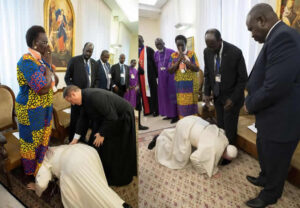
His visit included a prayer service at the John Garang Mausoleum and meetings with political leaders, where he challenged them to rise above personal interests. One of the most poignant memories was his gesture in 2019, when he kissed the feet of South Sudanese leaders during a Vatican retreat. This visit was the fulfillment of that dramatic appeal for peace. It marked a hopeful turn in the country’s search for reconciliation.
What His Pontificate Has Meant for Africa
Pope Francis’ journeys across Africa were not mere ceremonial visits, they were a call to conscience. He walked in slums, prayed in mosques, knelt before warlords, and stood beside the poor. He reminded the global Church that Africa is not a problem to be solved, but a people to be embraced. His pontificate has uplifted African voices in global Catholicism, challenged unjust structures, and inspired a Church that listens from below rather than speaks from above.
Francis’ pontificate has offered Africa a seat not at the margins, but at the center of the Church’s vision for renewal. His insistence that “the Church is not a customs house, but the house of the Father” has made African Catholics feel seen, heard, and included in global ecclesial life. For Africa, Pope Francis has been a messenger of peace, a friend of the poor, and a prophet of justice.
